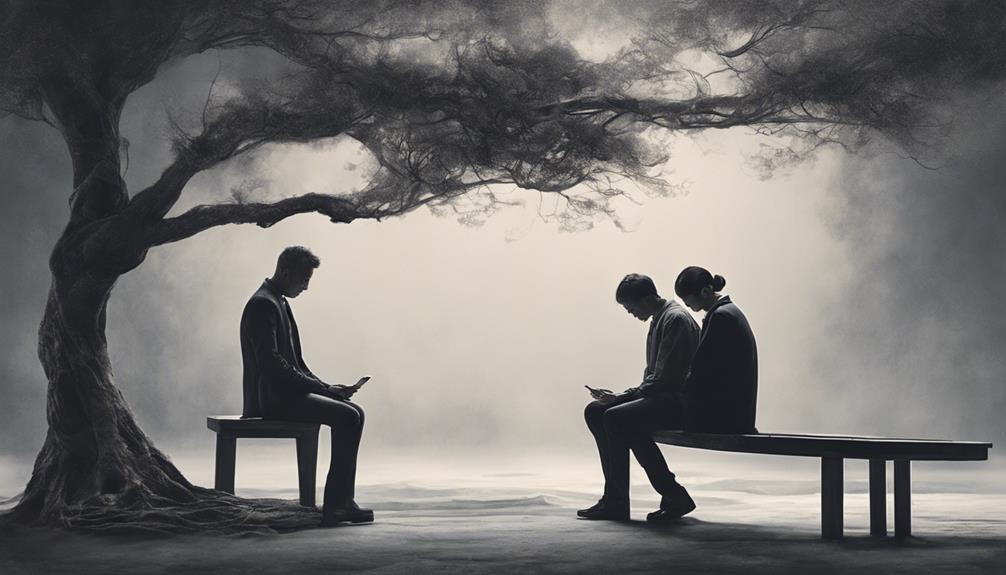In the journey of managing relationships, it’s fascinating to recognize that 93% of communication is conveyed without words. Grasping the nuanced indicators that suggest someone might be distancing themselves is crucial for nurturing more robust bonds.
When interactions start feeling strained or distant, it might be more than just a passing phase. By being attuned to the nuances in behavior and communication, we can potentially uncover important insights about the dynamics at play.
Stay tuned to uncover the key signs that could indicate someone is creating emotional distance and how to navigate these delicate situations with grace and understanding.
Key Takeaways
- Reduced communication frequency and quality indicates distancing.
- Excuses and avoidance behaviors demonstrate disinterest in maintaining closeness.
- Involvement in new social circles may signal a shift in priorities.
- Neglect and lack of effort highlight a diminishing connection.
Changes in Communication Patterns
When someone starts responding less frequently, delaying replies, or ignoring messages, it could be a sign that they're distancing themselves. Changes in communication patterns like receiving short responses or noticing a lack of questions can be concerning.
It's important to pay attention to these signs as they may indicate that the person is avoiding meaningful interactions. If you find that they frequently cancel plans or make excuses to avoid spending time together, it could be a red flag.
Feeling excluded or noticing shifts in their social interactions, such as spending more time with new friends, can also be indicators of distancing behavior. It's essential to approach the situation with understanding and empathy, offering support if needed.
Open communication and expressing your concerns gently may help in addressing any underlying issues causing the changes in their communication patterns. Remember, healthy relationships thrive on honest and open dialogues.
Excuses and Avoidance Behavior

We understand how challenging it can be when someone you care about starts using avoidance tactics or making flimsy excuses to avoid spending time with you.
It can feel disheartening when cancellations become a pattern, signaling potential disconnection.
Recognizing these common avoidance behaviors is the first step in understanding and addressing the situation with care and empathy.
Common Avoidance Tactics
In times of someone distancing themselves, recognizing common avoidance tactics like odd excuses and avoidance behavior becomes crucial for understanding the dynamics of the relationship.
When a friend starts using these tactics, it can be challenging to navigate the situation. Here are some common avoidance tactics to be aware of:
- Frequent cancellations of plans
- Unwillingness to engage in deep conversations
- Making excuses to avoid discussing important topics
- Showing disinterest in spending quality time together
Understanding these signs can help you address the issue with empathy and openness, fostering healthier communication and potentially resolving any doubts or uncertainties that may have arisen.
Flimsy Excuses Given
Recognizing flimsy excuses given by others can provide valuable insight into their avoidance behavior and potential distancing in a relationship. Flimsy excuses, such as sudden illnesses or last-minute work commitments, are common signs of avoidance behavior.
When friends constantly use these excuses to cancel or delay plans, it might indicate that they're pulling away and creating distance. Excuses like needing alone time or feeling too tired can be subtle signs of someone wanting space in the relationship.
Pattern of Cancellations
Frequent cancellations of plans without concrete rescheduling may signal avoidance behavior and a potential desire for distance in a relationship. It can be challenging when faced with a pattern of cancellations, as it may indicate a lack of commitment and reluctance to meet up. This behavior is a red flag that the other person might be avoiding making plans intentionally, showing disinterest in spending time together.
When vague rescheduling occurs without specific dates being set, it often hints at distancing behavior. It's essential to recognize these signs early on to address any concerns and communicate openly about the situation. Remember, your feelings and needs are valid too.
- Lack of commitment to meetups
- Avoiding making plans
- Reluctance to meet up
- Disinterest
Involvement in New Social Circles

We've all been there – when a friend starts spending more time with new people, it can feel like a wave of change. It's tough not to feel left out or wonder what shifted in your relationship.
Paying attention to how their activities, communication, and shared experiences change can give you valuable insights into their feelings and intentions.
Change in Activities
Noticing a shift in someone's involvement in new social circles can often reveal important changes in their priorities and interests. It's essential to pay attention to these subtle signs as they may indicate deeper feelings of exclusion or disconnection. Here are some key points to consider when observing changes in activities and social interactions:
- Increased time spent with new friends may lead to feeling excluded in social gatherings.
- Feeling disconnected from someone who's engaging more with a different social circle could signal potential distancing.
- Observing shifts in behavior towards spending time with new friends can reveal a desire for a different social dynamic.
- Changes in social interactions, such as receiving fewer invites or feeling left out, may highlight a shift in relationships.
Reduced Communication Frequency
During times of transition or change, individuals may naturally find themselves immersed in new social circles, leading to a reduction in communication frequency with existing connections. It can be challenging to notice this shift, especially when we feel excluded from social events or see changes in social media interaction.
Feeling left out or observing a shift in social dynamics might hint that someone is creating distance in the relationship. It's important to approach these situations with understanding and empathy, recognizing that people's social circles evolve over time.
Lack of Shared Experiences
Amidst the whirlwind of change, delving into fresh social circles can subtly signal a shift in priorities and interests, potentially leading to a lack of shared experiences with existing relationships. It can be disheartening to feel excluded or left out when someone close to you immerses themselves in new social circles.
Monitoring changes in social interactions, like being less involved in group activities, may hint at a deliberate choice to create distance. If you find yourself consistently left out of gatherings where the individual is present with others, it could signify a desire to disconnect from current social ties.
It's essential to navigate these shifts with understanding and open communication to maintain healthy relationships.
- Feeling excluded or left out in new social circles
- Monitoring changes in social interactions
- Being less involved in group activities
- Deliberate choice to create distance
Neglect and Lack of Effort

In relationships, signs of neglect and lack of effort can be emotionally challenging to navigate and understand. Neglect may present itself through reduced responses, delayed replies, or feeling ignored in conversations. Lack of effort can manifest in shorter answers, avoidance of certain topics, or a lack of interest in your life.
Consistently canceling plans, making excuses to avoid spending time together, or dodging commitments are clear indicators of distancing behavior. If you notice your partner not making an effort to see you, spending more time with new friends, or making you feel excluded in social circles, it could be a sign of neglect and lack of effort.
Lack of engagement in meaningful discussions, neglecting communication efforts, or displaying signs of anxiety are subtle signs that someone may be pulling away. It's important to address these behaviors with empathy and understanding, opening up a dialogue to clarify any concerns and feelings that may be present.
Signs of Anxiety or Depression

What're some indicators that someone may be experiencing anxiety or depression, and how can we offer our support? It's important to recognize the signs of these mental health challenges and provide the necessary care and understanding. Here are some ways we can help:
- Constant worry: If someone seems constantly anxious or worried about various aspects of their life, it could be a sign of underlying anxiety.
- Restlessness and difficulty concentrating: Individuals struggling with anxiety may exhibit restlessness and find it hard to focus on tasks due to their racing thoughts.
- Persistent sadness and loss of interest: A person experiencing depression may show ongoing feelings of sadness and a significant loss of interest in activities they once enjoyed.
- Physical symptoms and feelings of worthlessness: Anxiety and depression can also manifest in physical symptoms like increased heart rate and trembling, along with feelings of worthlessness and low self-esteem.
Reasons Behind Emotional Distancing

During challenging times in life, individuals may find themselves emotionally distancing for the need for personal space. It's crucial to understand that this behavior doesn't always stem from a lack of care or concern.
Sometimes, relationships start to feel less fulfilling or satisfying, prompting the need for distance to reassess personal priorities and values. Developing new interests can also lead to emotional distancing, as individuals immerse themselves in different activities or goals.
Misalignment in values or priorities between individuals can create a sense of discord, causing one or both parties to create emotional distance as a means of self-preservation. It's essential to respect these decisions, as everyone deserves the autonomy to navigate their emotions and relationships in a way that feels authentic to them.
Actions to Take When Distance Is Noticed

When noticing signs of someone distancing themselves, it's important to address the issue openly and honestly to understand the reasons behind their behavior.
Here are some actions to take when distance is noticed:
- Have an open and honest conversation: Initiate a dialogue to express your concerns and listen actively to their perspective.
- Improve communication: Work on enhancing communication channels to bridge any gaps and foster mutual understanding.
- Respect boundaries: Acknowledge their need for space while showing your support and readiness to talk when they're comfortable.
- Prioritize quality time together: Invest in building a stronger relationship by spending meaningful time and engaging in activities that promote bonding.
Frequently Asked Questions
How Do You Tell if Someone Is Being Distant With You?
We notice when someone seems distant through reduced responses, delayed replies, or being ignored. Lack of interest, short answers, and avoidance of topics may signal distancing. Observing changes in behavior, social interactions, or excuses also reveal this shift.
How to Tell if Someone Is Distancing Themselves From You Over Text Message?
We can sense when connections shift. Delayed replies, brief messages, or less frequent chats may hint at emotional distance. Sudden changes in texting patterns could signify someone pulling back. Trust your instincts and communicate openly.
What to Do if Someone Is Distancing Themselves From You?
If someone is distancing themselves from you, address the issue openly with honesty and empathy. Express concerns calmly, listen actively, offer support, and focus on building a stronger relationship. Early recognition and improved communication are key.
How Do You Tell if Someone Is off With You?
We notice changes in behavior like decreased communication, avoidance of deep talks, and reluctance to share personal details. These signs may indicate someone is distant. It's important to approach them with care and understanding to address any underlying issues.
Conclusion
As we navigate the complex terrain of relationships, it's vital to recognize the subtle signs of someone pulling away. By paying attention to changes in communication, excuses, and emotional neglect, we can take proactive steps to address the distance.
Remember, relationships are like delicate flowers – they require care, attention, and nurturing to bloom. Let's cultivate understanding, practice empathy, and strive for stronger connections with those we cherish.









